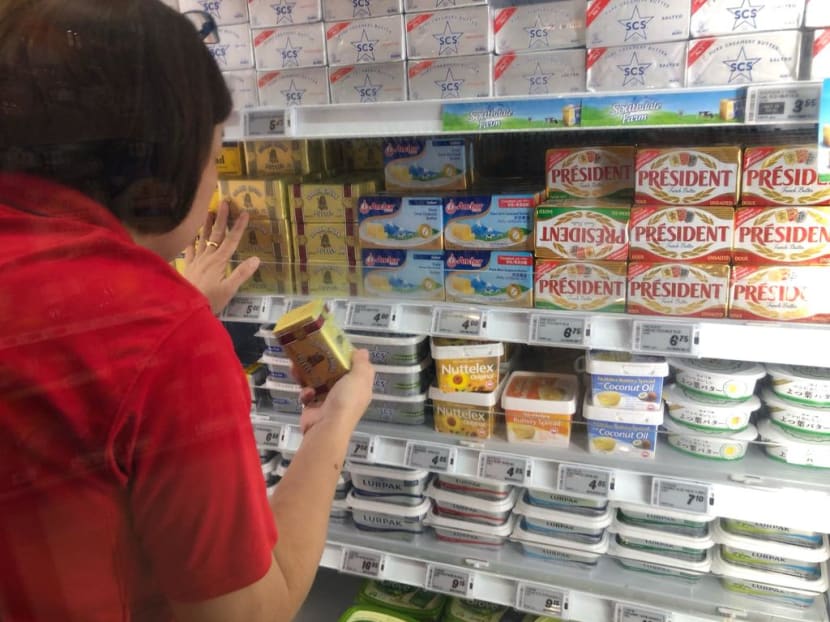Explainer: What are artificial trans fats and why is Singapore banning them?
SINGAPORE — Artificial trans fats, which are found in pre-packaged foods such as instant noodles and peanut butter spreads, will be banned in Singapore from June 2021.

Artificial trans fats, found in a range of popular foods, will be banned in Singapore from 2021, two years ahead of the target of 2023 set by the World Health Organization for the elimination of this harmful ingredient around the globe.
SINGAPORE — Artificial trans fats, which are found in pre-packaged foods such as instant noodles and peanut butter spreads, will be banned in Singapore from June 2021.
What are these fats and why is Singapore banning them? TODAY takes a closer look.
WHAT ARE ARTIFICIAL TRANS FATS?
Saturated and unsaturated fats form the two main categories of fats, with artificial trans fats being a variant of unsaturated fats.
Unsaturated fats are mooted as the healthier choice as they lower blood cholesterol, but they are hard to use because they are liquid at room temperature. Examples include canola oil, olive oil and sunflower oil.
Artificial trans fats are modified unsaturated fats. A key source of artificial trans fats, partially hydrogenated oils (PHOs), are created by an industrial process which converts liquid oil to semi-solid fats.
WHAT ARE THE SIDE EFFECTS OF ARTIFICIAL TRANS FATS?
While artificial trans fats are easy to use, inexpensive to manufacture and increase the shelf life of products, they lead to increased low-density lipoproteins (LDL) or "bad" cholesterol levels, a risk factor for cardiovascular disease.
Artificial trans fats also cause the level of high-density lipoproteins (HDL) or “good” cholesterol to decrease. This further compounds the ill effects of artificial trans fats, since “good” cholesterol particles helps to clear “bad” cholesterol particles from the bloodstream.
Studies have shown that a 4g increase in daily trans fat intake is associated with a 23 per cent increase in the incidence of cardiovascular disease.
There are no safe levels of consumption for artificial trans fats, the Ministry of Health (MOH) noted in the background information it supplied with news of its announcement.
Singapore’s national average daily trans fat intake was 1g per person per day in 2018, a significant drop from 2.1g per person per day in 2010.
Right now, four main categories of pre-packaged foods make up more than 90 per cent of the trans fat that Singaporeans consume. These include:
Fat spreads and creamers such as peanut butter and three-in-one coffee mixes
Packaged meals such as instant noodles and ready-to-eat meals
Baked goods such as cakes and biscuits
Snacks such as potato chips and popcorn
The remaining 10 per cent or less are sourced from the food service sector, found in products such as edible oil and margarine. This 10 per cent is already regulated by existing legislation in Singapore, which limits artificial trans fat in fats and oils to no more than 2 per cent of total fat content.
WHAT IS BEING DONE GLOBALLY?
In May 2018, the World Health Organization called for the total elimination of artificial trans fats in diets by 2023.
Countries such as Canada and the United States and Canada have banned PHOs since 2018. A regional neighbour, Thailand, similarly moved to ban PHOs in January this year.
Companies in these countries have switched from artificial trans fats to healthier oils such as unsaturated oils.
Other countries such as Argentina, China and Saudi Arabia have made it mandatory for manufacturers to disclose the level of trans fat on the nutritional information panel on packaged foods.
Various limits have also been placed on the amount of artificial trans fat in different types of foods. For instance, Denmark and Norway cap the amount of artificial trans fats in all fats, oil and packaged foods at 2 per cent of total fat content.
Singapore imposes a 2 per cent limit only on fats and oils. The upcoming ban in 2021 will include all food products, including packaged foods, whether manufactured here or imported.









